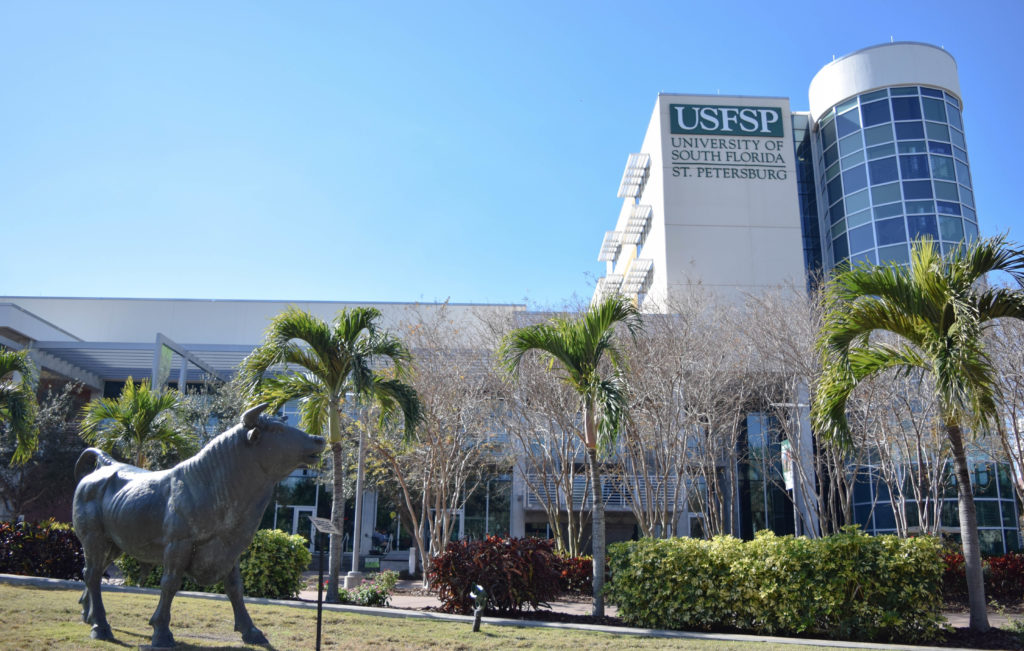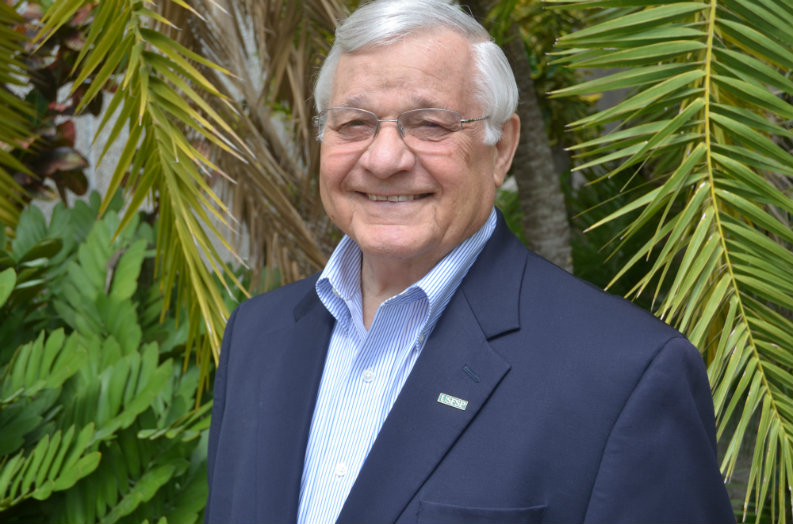
By Nancy McCann
It is, says professor Ray Arsenault, “the elephant in the room.”
When the three campuses of the USF system are consolidated in 2020, St. Petersburg will lose the independent accreditation it has enjoyed since 2006.
It may also lose a lot more, according to Arsenault, the president of the USF St. Petersburg Faculty Senate.
There is talk, he and others say, that St. Petersburg and Sarasota-Manatee may be designated “instructional sites,” not “branch campuses.”
That is not a picayune difference in semantics. In the language of academic governance, the difference can be significant.
As an instructional site, St. Petersburg would cede most administrative power, including budgetary and hiring authority, to the main campus in Tampa.
An instructional site is generally considered less prestigious than a branch campus, and according to some professors, faculty research could become less of a priority – a change that could make it harder for St. Petersburg to attract and retain top faculty.
“I first heard about this last fall as a rumor, but it now has become clear that this is a real possibility,” Rebecca A. Johns, an associate professor of geography, said in an email.
As a branch campus, she wrote, St. Petersburg would “maintain some control over our programs and faculty, continue to provide our students with a rich academic and social community, and hopefully maintain much of what has made this campus special and unique.”
While the implications of an instructional site designation are largely unknown, she wrote, “it seems likely” that it would mean “no research funds or support for research infrastructure on our campus, and a much pared down (or non-existent) administrative and service structure.”
Johns’ concerns were echoed by others.
“Becoming an ‘instructional site’ would be highly detrimental to research on campus,” Thomas Hallock, a professor of English, said in an email.
It would “move us back 20 years” and “go against the whole spirit of our campus,” said Jay Sokolovsky, a professor of anthropology. “It would validate what I said at a town hall meeting about consolidation being the 9/11 for the St. Pete campus.”
But Regional Chancellor Martin Tadlock predicted faculty research would not suffer.
Whatever designation St. Petersburg gets, he said, “the expectations for research will be higher … We are becoming part of a high-research institution. We have to provide that for all faculty.”
Planning for consolidation has been underway since last summer, and final recommendations must go to the USF system Board of Trustees by Feb. 15.
The latest documents from the 13-member Consolidation Task Force and a Consolidation Implementation Committee composed of 86 administrators, professors and staff include a final subcommittee recommendation to designate St. Petersburg and Sarasota-Manatee as branch campuses.
But when that recommendation was presented to the task force on Nov. 29, chairman Jonathan Ellen – who has since resigned – seemed to go out of his way to downplay the branch campus designation.
“I think it becomes one of these things … where you start with that idea as a branch (campus), but recognizing that as you develop the process it may not withstand what is the definition – that tipping point – of what makes it a branch campus versus an instructional campus,” he said.
“I think that still needs to be played out.”
When Pinellas County legislators introduced their plan to abolish the separate accreditation of the St. Petersburg and Sarasota-Manatee campuses last year, they said it would enrich academic opportunities on the two small campuses.
USF Tampa was then on the verge of becoming a “preeminent state university,” a long-sought achievement that would bring millions of extra dollars from the state each year.
If St. Petersburg and Sarasota-Manatee were merged with USF Tampa into a single, unified university, legislators said, the two small campuses would get some of that preeminence money.
A few months later, USF Tampa was awarded preeminence status as expected – a boost in prestige that also brought $6.15 million in additional state money for the 2018-2019 year.
Ironically, it is preeminence that has sparked fears that the St. Petersburg campus might be downgraded to an instructional site.
To achieve preeminence each year, a state university must meet high standards in at least 11 of 12 metrics designed to measure academic achievement. The metrics range from freshman retention and four-year graduation rates to yardsticks like size of endowment and research spending.
In 2018, USF Tampa met or exceeded 11 of the 12 metrics.
But adding St. Petersburg and Sarasota-Manatee to the mix would pull down Tampa’s numbers, according to a chart presented to the USF system Board of Trustees on Jan. 14.
If nothing changes, a consolidated USF would fall short in four of the 12 metrics in 2020, according to the chart.
USF system President Judy Genshaft, who led the yearslong campaign that led to preeminence for Tampa, has stressed that she wants the consolidated university to achieve preeminence as well.
“Strengthening Florida preeminent university status for the (unified) University of South Florida is absolutely, absolutely our No. 1 goal and everything else falls in place with preeminence,” she said at the trustees meeting.
“Having this be systemwide in one consolidated structure is absolutely one of the best things we can do for our students … and faculty.”
St. Petersburg has already begun taking steps to pull up key numbers in admissions, freshman retention rate and graduation rates.
But making St. Petersburg an instructional site – as opposed to a branch campus – would give Tampa more control over St. Petersburg in the effort to ensure that St. Petersburg doesn’t jeopardize preeminence.
Although consolidation planning has been underway since last summer, the trustees learned Jan. 14 that the Consolidation Implementation Committee still has not finalized some critical recommendations.
The CIC put out an urgent call for more input from faculty and staff earlier this month, and St. Petersburg campus leaders nominated people to help on at least 17 new teams that will work up suggestions on key issues.
Among the issues that the CIC must still hash out before making recommendations are where colleges and schools should be based, how curriculum consolidation should be handled, and what the roles and responsibilities of campus leaders should be.
After the trustees meeting, CIC co-chair Donna Petersen said her committee was not specifically asked to address the issue of branch campus vs. instructional site for St. Petersburg and Sarasota-Manatee.
But that is “likely to come up,” she said.
The CIC and Consolidation Task Force must report their recommendations to the trustees by Feb. 15. In turn, the trustees must recommend a plan to the board that oversees Florida’s public universities by March 15.
What they’re saying
Branch campus or instructional site? Professors weigh in
Thomas W. Smith, professor of political science and director of the Honors Program:

“Honestly, I’m not sure one is necessarily better than the other.
“The real question is how does St. Pete participate fully in USF as a preeminent research university? I see potential advantages to being incorporated into academic departments in Tampa, but definite downsides, too.
“Clearly this would work better for some departments than others. A branch campus promises greater autonomy, so that’s probably the direction we should move. But branch campuses are notorious for being starved for resources.
“There is no guarantee that we will thrive under either model. Normally, in a decision as pivotal as this the options would be developed so that we can make an informed choice. But as far as I can see there are almost no concrete commitments on the table.”

Bill Heller, former dean of the College of Education and campus dean/CEO in 1992-2002:
“Branch campus is acceptable. The other is not.”
Deby Lee Cassill, associate professor of biology:
“I was unaware of the move to make our campus an instructional site. I cannot speak about this policy’s effect on other tenured, research-oriented faculty, but I will say this. I will continue to do research regardless, as will my colleagues in Biology.
“Our research productivity in Biology has been noteworthy. For example, in 2017, Dr. J. Sean Doody published eight papers in peer-reviewed scientific journals, including five major articles. Two of these were in prestigious journals (Ecology, Biological Reviews).
“He also has 11 papers accepted or in press, including four major articles and seven notes. He is preparing seven papers for publication, including six major articles.
“Dr. Doody is working on a book on the social behavior of reptiles. Most of our tenured faculty publish several papers a year.”
Julie Buckner Armstrong, professor of English:
“No matter what happens with consolidation, I’ll continue to write books and teach classes.”
Thomas Hallock, professor of English:

“My understanding, last time I heard, is that USF St. Petersburg would be a branch campus. Do not, not, not want to become an ‘instructional site.’
“I am fine with ‘research’ and ‘teaching’ designations among faculty, but those lines should be made by actual research productivity — not strictly geographic (campus) lines.”
“Becoming an ‘instructional site’ would be highly detrimental to research on campus. In my area, English, my colleagues and I continue to maintain very robust research agendas.”
Jay Sokolovsky, professor of anthropology:
“This would go against the whole spirit of our campus. If it goes to an instructional site, it would validate what I said at a town hall meeting about consolidation being the 9/11 for the St. Pete campus.
“It would be a betrayal to (our) campus and move us back 20 years.”
Rebecca A. Johns, associate professor of geography:
“I first heard about this last fall as a rumor, but it now has become clear that this is a real possibility.
“I think all faculty and staff on our campus would be impacted and should be concerned about this issue.

“Clearly, being designated as a branch campus is the preferable outcome; this designation would allow us to maintain some control over our programs and faculty, continue to provide our students with a rich academic and social community, and hopefully maintain much of what has made this campus special and unique.
“We know very little about how the designation of our campus as an instructional site would be manifest. It seems likely that instructional site status would mean no research funds or support for research infrastructure on our campus, and a much pared down (or non-existent) administrative and service structure.“I am hopeful that USF St. Petersburg will be designated as a branch campus, not an instructional site, so that all of the hard work and dedication of countless people that have made this campus so special and so successful will not be wasted.”
James Bennett III, Anna Bryson, Amy Diaz, Dylan Hart, Michael Moore Jr., Dinorah Prevost and Emily Wunderlich contributed to this report.



